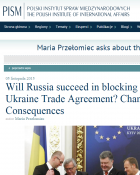Taras Kuzio: This is a very difficult question to answer for three reasons. Firstly, the EU Deep and Comprehensive Free Trade Area agreement (DCFTA) is enlargement-lite or enlargement on the cheap. Ukraine, with a worse communist and colonial legacy than Central Eastern Europe, has to undertake half to two thirds of the Copenhagen Criteria reforms with significantly less EU assistance than earlier prospective members and with no membership offer, which was always an important motivator.
Secondly, will the Ukrainian government, president, and parliament undertake the reforms that are required when two factors are at work—war with Russia and the bankruptcy inherited from President Yanukovych—that did not exist in the prospective Central Eastern European members?
Thirdly, there are traditional allies (i.e., Greece), personality mavericks (Berlusconi) and nationalist populist leaders in the EU who will always assist President Putin and wish an end to sanctions. These groups opposed ratification of the EU Association Agreement in the European Parliament and are holding a non-binding referendum in the Netherlands. EU leaders in Minsk 1 and 2 pressured President Poroshenko to accept Russian demands.
Stefan Meister: No, I don't think Russia will succeed in blocking Ukraine’s admission into the EU trade zone. If the EU would again accept that the implementation of the DCFTA with Ukraine will be suspended, it would spell the end of the EU's Neighborhood Policy, as the association and free trade agreements are the core of the EU’s outreach. If a third country is able to block the implementation of a signed agreement, the EU would give up its will to shape and reform its direct neighborhood. The consequence would be the destabilization of the respective countries and the acceptance of a Russian sphere of influence. That would set a bad precedent, not only applicable to Ukraine but with ramifications for Georgia and Moldova as well. It would be the wrong signal to Ukraine and Russia.
If the DCFTA with Ukraine will be implemented, it would send a strong signal to Ukrainian society and other post-Soviet countries that the EU is still a player in the region and Brussels is willing to go head-to-head with Moscow on the common neighborhood to implement its interests. Besides sanctions, comprehensive support for the implementation of AAs/DCFTAs should be the EU’s response to Russian aggression in Ukraine and Moscow’s destabilization of the common neighborhood.
Dr. Taras Kuzio is a Senior Fellow at the Canadian Institute of Ukrainian Studies, University of Alberta, Canada; Author of the newly published book, “Ukraine: Democratization, Corruption and the New Russian Imperialism” (June 2015).
Dr. Stefan Meister is Head of Program on Eastern Europe, Russia, and Central Asia at the German Council on Foreign Relations (DGAP).
This piece was originally published as a blog entry by the Polish Institute of International Affairs.

